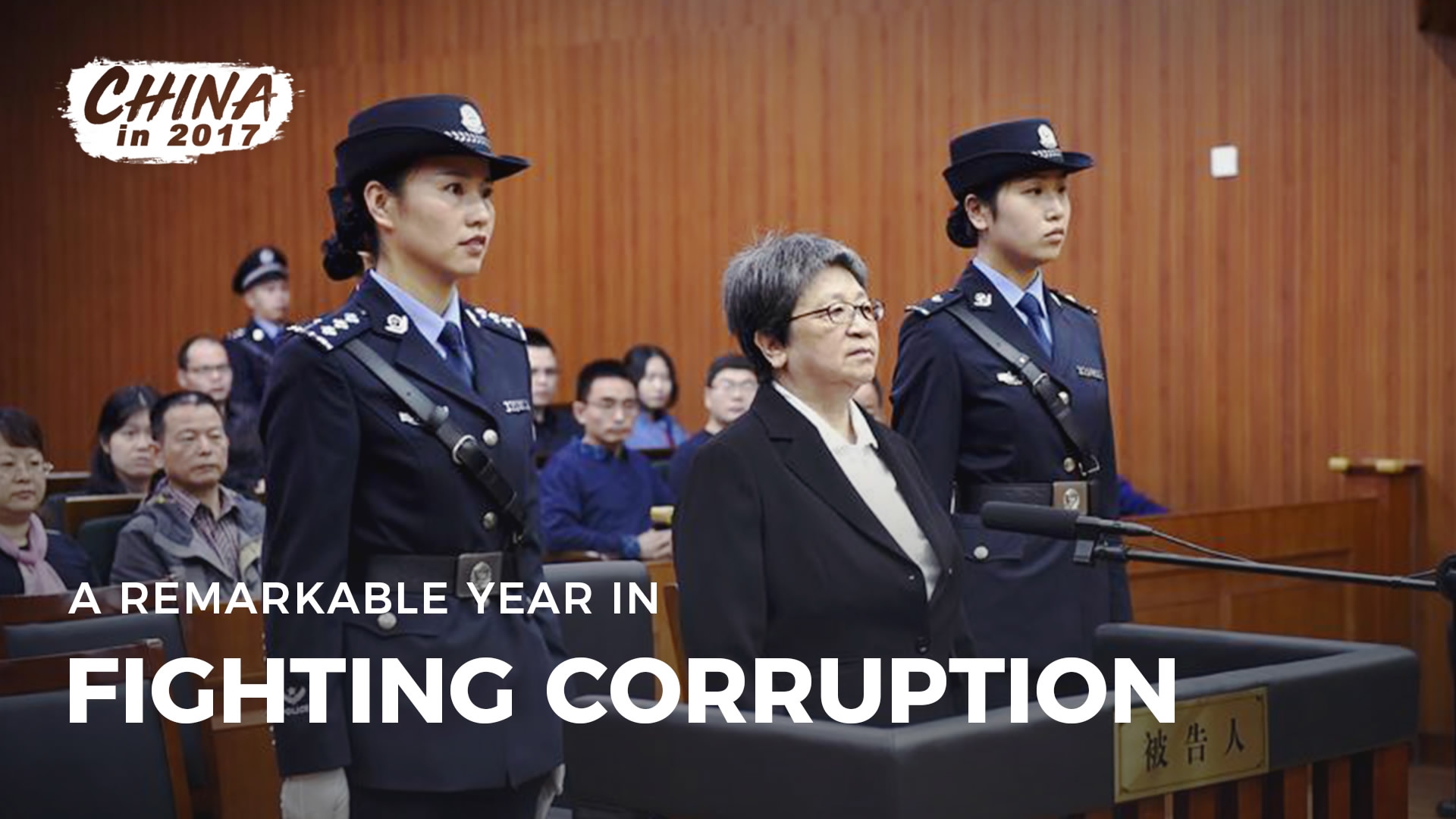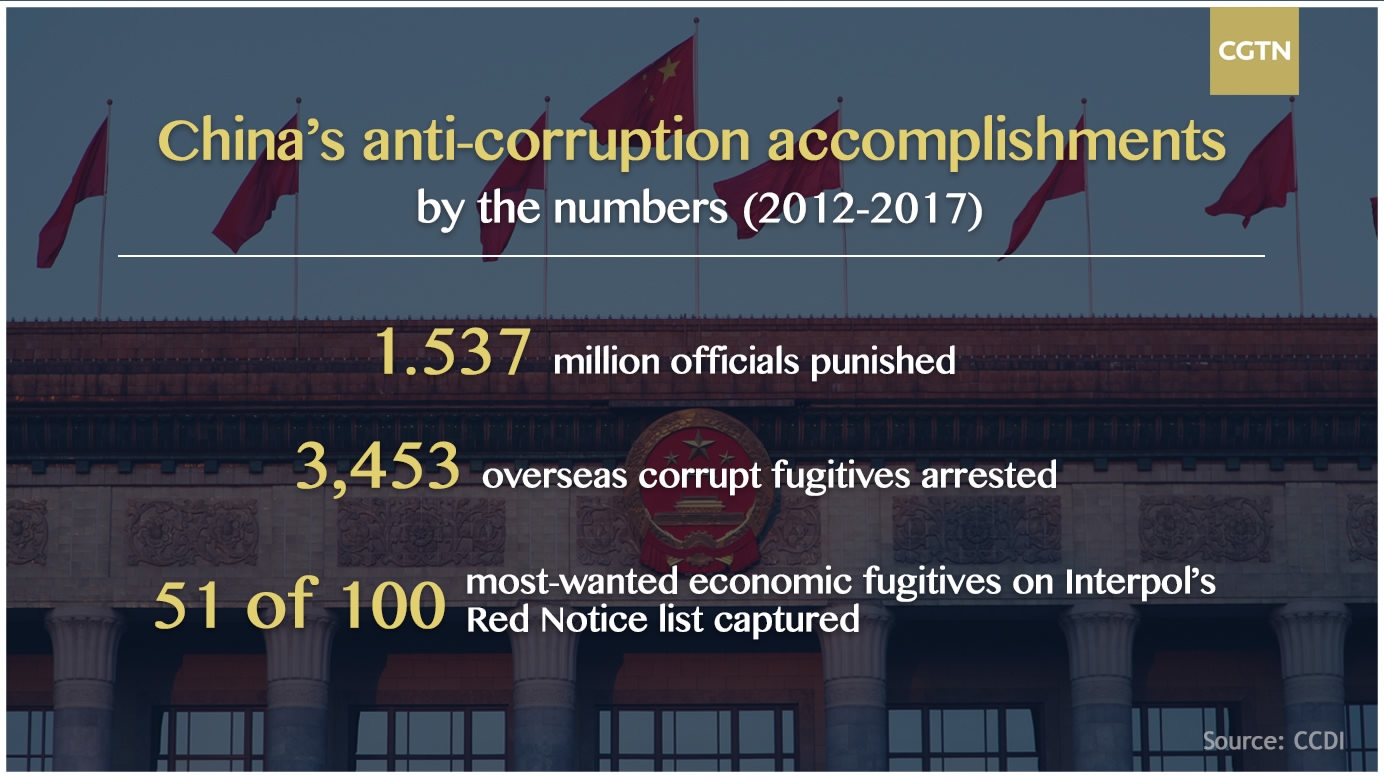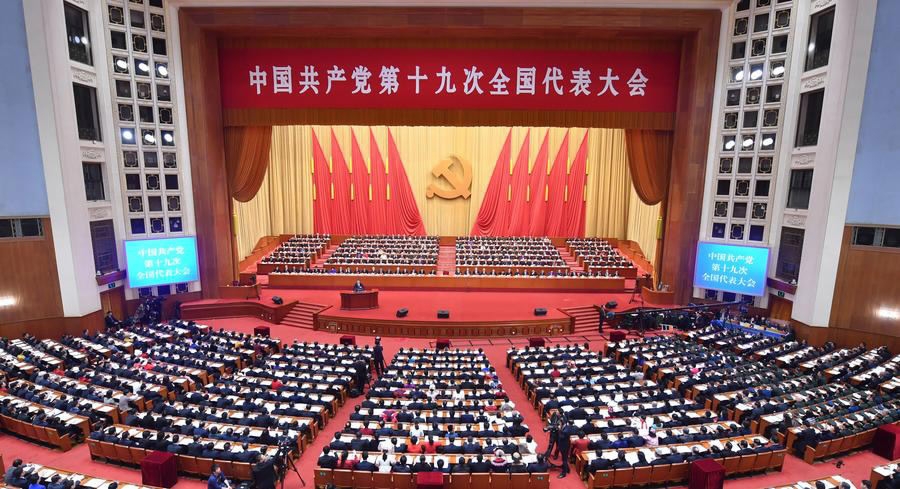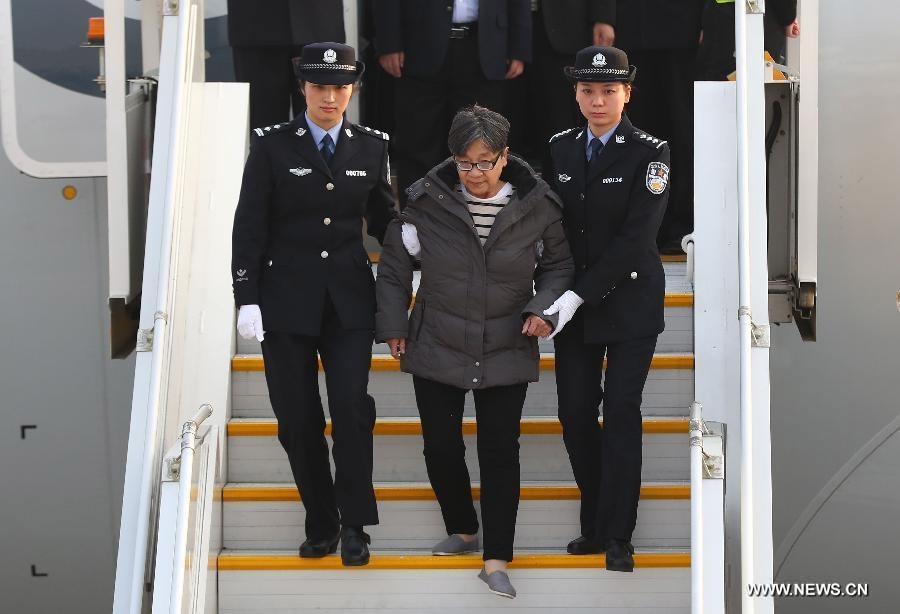
Politics
10:51, 25-Dec-2017
China in 2017: Momentum of corruption crackdown on the rise
CGTN

“The people resent corruption the most, and corruption is the greatest threat our Party faces… We must remain as firm as a rock in our resolve to build on the overwhelming momentum and secure a sweeping victory,” Xi Jinping says.
Corruption has long been seen as one of the major headaches for the government and the Communist Party of China (CPC), and the most despised social problem for the Chinese. As Xi Jinping, Chinese president and general secretary of the CPC Central Committee, has stressed on many occasions, there is a need to address public concern.
When Xi declared war on corruption in 2012, no one really expected the campaign would be so sweeping and relentless. Now five years on, everyone wonders who is next?
In an interview with the Wall Street Journal in 2015, Xi said: "Our people hate corruption more than anything else and we must act to allay their concerns. Therefore, we decided to go after both ‘tigers and flies,’ wrongdoers regardless of their ranks."
He identified the country’s endemic corruption culture as one of the key challenges that undermines the CPC’s ruling and legitimacy. The eradication of corruption will help "avoid the historical cycle of rise and fall," he said.
People wish to see a clampdown on corruption, and the ultimate purpose of the CPC is to serve the people, he stressed.
At the opening of the 19th CPC National Congress in October, Xi praised the anti-corruption campaign, saying it gained a "crushing momentum" in the past five years and urged the need to continue pressing ahead with the movement.
Below is a checklist of the achievements of China's crackdown on corruption.

1. Caging tigers and netting flies
At a meeting with the Party’s top disciplinary body in early 2013, Xi told officials they must support the fight against tigers and flies, high and low ranking officials respectively. They must also resolutely investigate cases of prominent officials breaking the law and earnestly resolve corruption problems taking place around the people.
Today, the war on corruption is still flaring up. In a high-profile press conference during the 19th CPC National Congress, the CPC Central Commission for Discipline Inspection (CCDI) presented the world with a shining list of its anti-corruption work.
Over 1.537 million officials have been punished for corruption and abuse of power. Of the 440 high-ranking officials taken down from provincial or corps level, 43 were members and alternate members of the CPC Central Committee, the CCDI said.
China’s anti-graft work has been taken to new heights, it added.
In the first nine months of this year, over 383,000 officials were punished. Fifty-six of them were provincial-level officers. Former Chongqing Party chief Sun Zhengcai, former Gansu Party chief Wang Sanyun and former chairman of China Insurance Regulatory Commission Xiang Junbo were three of the many "tigers" who were taken down this year, the CCDI said in a statement this month.
The top anti-graft watchdog said it will continue with a strengthened crackdown on corruption in the coming years.
2. Eight-point regulation: rooting out extravagance
Xi announced the eight-point regulation – the call to streamline bureaucracy and to cut waste and extravagance – at a meeting of the Standing Committee of the Political Bureau of the CPC Central Committee in December 2012.
Five years later, the disciplinary authority said much has been accomplished in the fight against lavishness.
After calling on officials to adopt an austere lifestyle, central and local governments quickly rolled out measures to oversee the implementation of the new guidelines. Red carpets, empty speeches and traffic controls during officials’ trips are now much less seen, the CCDI said.

Xi Jinping delivers a report to the 19th CPC National Congress at the Great Hall of the People in Beijing, October 18, 2017. /Xinhua Photo
Xi Jinping delivers a report to the 19th CPC National Congress at the Great Hall of the People in Beijing, October 18, 2017. /Xinhua Photo
As of October 31, 2017, the country’s top disciplinary authority said it investigated 193,168 cases suspected of violating the austerity guidelines and punished 162,594 officials.
The number of cases has dropped significantly, slipping to 3.77 percent in the first eight months of 2017 from 52.2 percent in 2013.
Spending on the so-called "three public expenses" – namely government vehicles, expensive meals and trips abroad – has fallen remarkably. According to the Ministry of Finance, the expenses at the central government level have dropped 35 percent for four years in a row to 2.6 billion yuan in 2016.
But the CCDI has warned that such misbehavior has not been completely wiped out and promised to continue calling for austerity among officials. In November alone, over 6,100 officials involved in 4,350 cases were punished for attending expansive banquets, sightseeing with government funds and using government vehicles.
3. Overseas fugitives arrested
The return of Yang Xiuzhu, who topped the list of China’s most-wanted overseas fugitives, in 2016 is symbolic of the success of the country’s efforts to serve justice and hunt overseas economic runaways, the official People’s Daily newspaper has written.

Yang Xiuzhu returns to China after having fled the country in 2003. She is seen flanked by police officers at Beijing Capital International Airport in Beijing, November 16, 2016. /Xinhua Photo
Yang Xiuzhu returns to China after having fled the country in 2003. She is seen flanked by police officers at Beijing Capital International Airport in Beijing, November 16, 2016. /Xinhua Photo
In April 2015, China published a list of 100 of its most-wanted corrupt fugitives, many living in the US, Canada and Australia. Yang was the first on the list, and she returned to China from the US in November 2016 after fleeing the country in 2003. The former deputy mayor of Wenzhou in the booming eastern province of Zhejiang was sentenced to eight years behind bars in October.
As of this month, 51 fugitives from the list have turned themselves in and returned to China.
The CCDI also launched the so-called Fox Hunt and Sky Net operations in a bid to catch every single corrupt official who had fled abroad. So far, over 3,587 fugitives have turned themselves in and over 9.5 billion yuan in misappropriated assets have been seized.
4. More checks and oversight
At the 19th Party Congress, Xi warned CPC members that the Party is determined to secure a "sweeping victory" in the war on corruption, and to achieve the goal, more checks and oversight are needed.
While the CCDI has played a decisive role in fighting the war against corruption, Xi said a supervisory commission system is needed to secure power in the institutional field. Therefore, the Party will build a supervisory commission from the top to the grassroots, covering the national, provincial, city and county levels. The new supervision body will work closely with the CCDI.
A national supervision law will be created, making the supervision system legitimate.
Corrupt officials who think they can escape punishment will be disappointed, as Xi is determined to carry on with the campaign until corruption is stamped out. In 2018, the anti-corruption campaign will mean tougher and more prolonged crackdown. It is good for the Party, the country and the people, as Xi has put it.
Read more:

SITEMAP
Copyright © 2018 CGTN. Beijing ICP prepared NO.16065310-3
Copyright © 2018 CGTN. Beijing ICP prepared NO.16065310-3